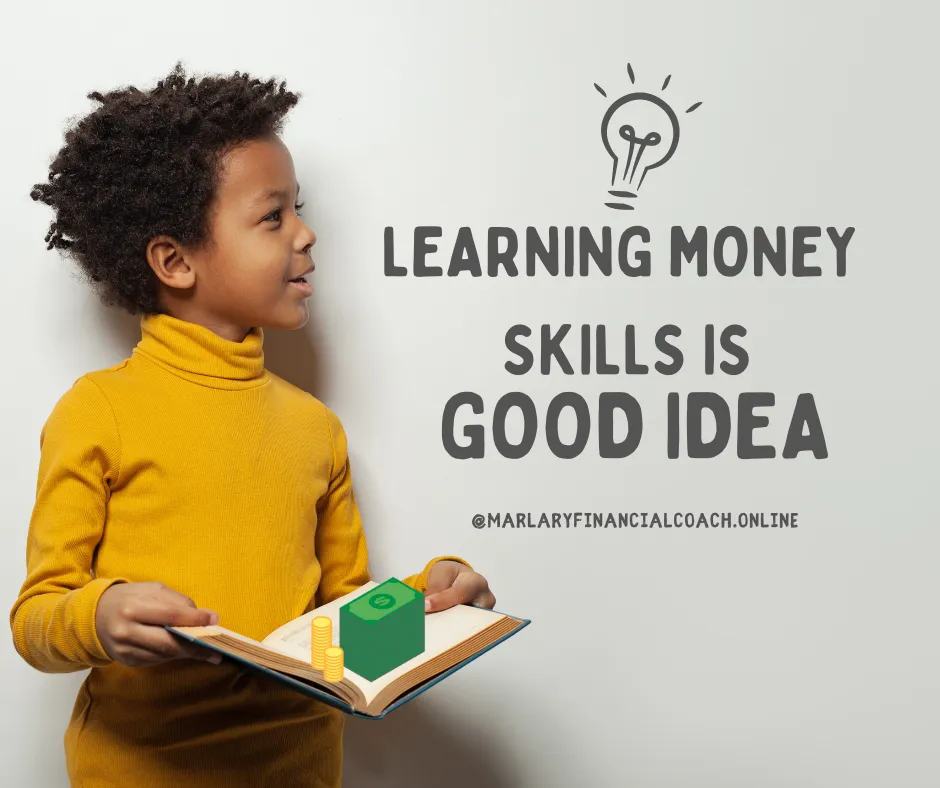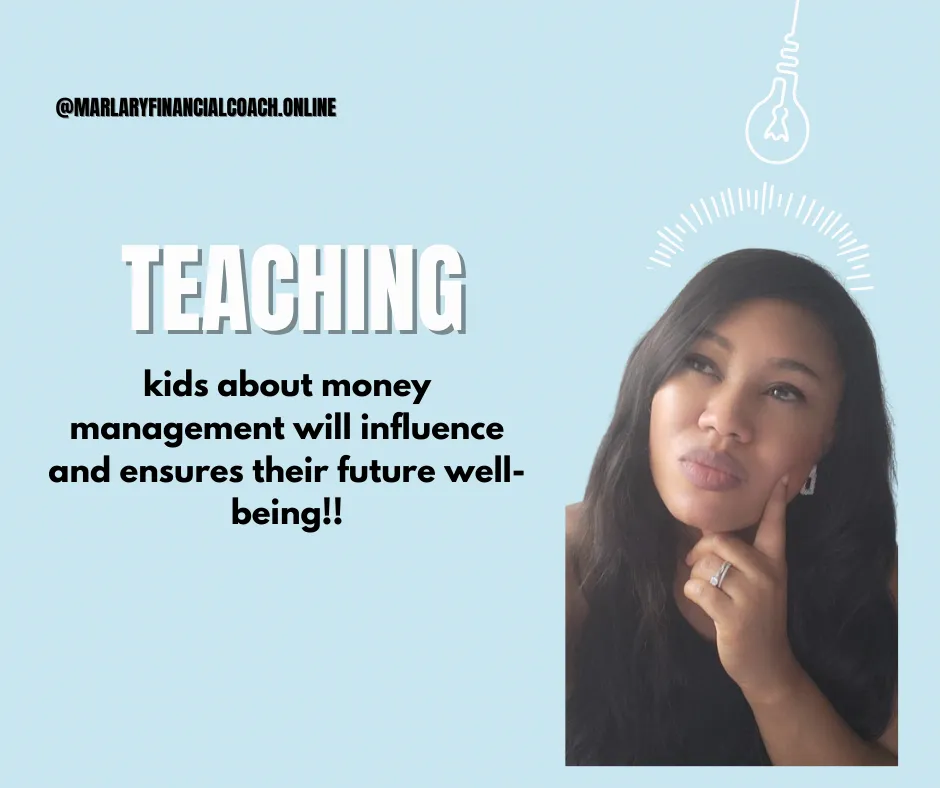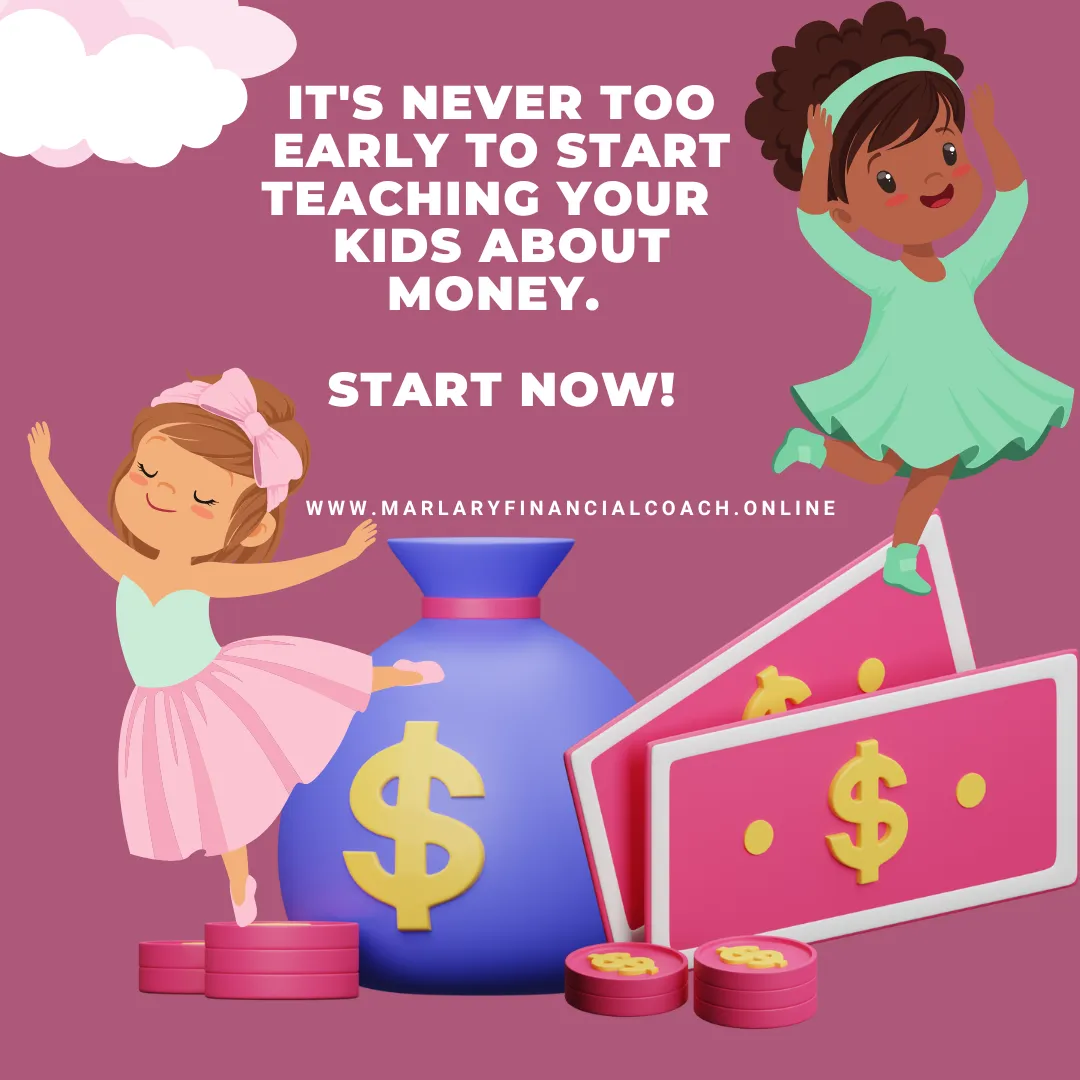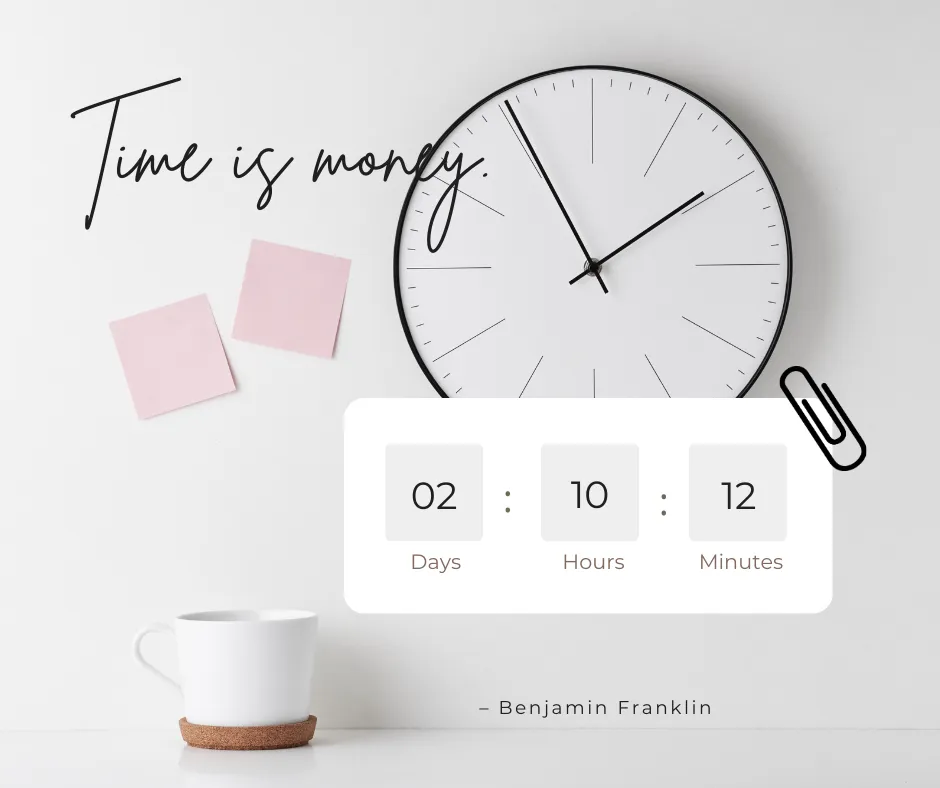Marlary Financial Coach, Presents:
"TEACHING YOUR KIDS TO BECOME BETTER MONEY MANAGERS"
Stop living in the past, start living in the future! Start teaching your kids about money management today!
Are you a parent with your kids future at heart?
Does this sound like you?
• You struggle with money management yourself.
• You struggle with feeling not so qualify to be teaching money lessons.
• You struggle with not knowing how to ensure your child/children get the best money management lessons; you want to see them safe, happy, and satisfied even after they grow older.
• You struggle with helping them gain the major benefits associated with financial literacy, like, improved discipline (finance-wise) as well as a stronger critical thinking skills .

What if things could be different?
PREPARATION FOR FUTURE
The most obvious benefit of educating your kids in finances is the preparation you’re giving them. Kids will need to
understand finances and money management
to use in their teenage years and adult life. It gives them valuable experience and knowledge that will be useful in many aspects of their lives.
GIVING THEM STABILITY
Financial life carries a part in so much of our lives as adults, from stress levels to the likelihood of crime to job life to home life to relationships and more. By educating your child on this topic and how to discuss it better, you’re giving them the opportunity to have much more stable situations in finances and in areas that overlap.
YOU LEARN TOO
Sometimes you may have to learn about topics that you’ve never really learned about or looked at in your own finances to be able to teach your kids about them. So you can learn more about your own habits as well as improve. This is particularly true if you have to do more research to educate your kids better on the topic

If you’re finding yourself nodding along to all this, you’re not alone…
Realistically, finances and money management has so many options of education and a ton of great benefits to parents and children when they’re talked about more openly. Your kids will surely thank you for having this education.
Most schools aren’t going to teach them these pertinent life lessons, so it’s up to you!
It’s not common for kids to be educated about finances, due to the fact that most schools don’t discuss it and the general home avoidance of the topic, so by teaching your child this information you can inspire a pattern. Kids that learned about this topic at an early age are more likely to carry on the practice in their own children someday.
. Talking about money management and teaching your kids can be super easy. It can be something as simple as starting an allowance or chores to earn money or talking to them about your own financial habits. It’s especially easy when you’re handling this with younger kids because you can keep the talk simple.
Which is why I’m soooo excited to introduce:
TEACHING YOUR KIDS TO BECOME BETTER MONEY MANAGERS!
Why Teaching Kids About Money Is Important.
This mini-course I've put together will show you, in just a few steps, how to instill positive money habits in your kids as well as the benefits associated with financial literacy for kids that might inspire you to take action.

Here’s what you’ll get when you buy/join:
01
The easiest way to teach children the value of money
Remember that children at different ages conceptualize money matters differently. This course helps you gear money lessons around what is understood by the child, giving more responsibility to older children, but never underestimating younger children’s ability to observe your habits and attitudes toward money.
Value: $100
02
Day-to-Day Mini-Money Lessons
Money management must be learned and practiced. This course provides a value packed teaching of habits in everyday home and family life to better prepare your children for “real” life. These lessons can be included in day-to-day activities and errands, and don’t need to take much time out of any schedule.
Value: $100
03
All About Allowances
This courses teaches the benefits of implementing and allowance system for your kids. Allowances help you and children have more control over children’s finances—especially if it is clear that an allowance isn’t “bonus” money, but money that needs to pay for certain expenses.
Value: $100
A total value of: $300.00
Get the course for only $19.99

“The amount of money you have has got nothing to do with what you earn, it's what you spend. ”
— Paul Clitheroe

“ Formal education will make you a living, self-education will make you a fortune.”
— Jim Rohn

“ If you want your children to turn out well, spend twice as much time with them, and half as much money.”
— Abigail Van Buren

Still on the fence about it?
100% Satisfaction Guarantee
If you enroll and you’re not satisfied here is what we’ll offer you...
100% money back within 3 hours of your purchase window!
A total value of: $300.00
Get the course for only $19.99
Frequently asked question from kids
Why can’t we afford to go on a nice vacation?
“Let’s just go and play somewhere near for now. Don’t worry, we will go on a vacation soon. In fact, mom and dad are already saving so we can do something fun. We are just putting our needs for the house first.”
Why can’t you buy me the things that I want?
“Because on the top of our ‘to-buy’ list are the things that make us healthy. Everything else that makes us happy is up for approval. Why? because not everything that makes us happy, makes us healthy.”
What’s cheap and expensive?
“Cheap is easy to buy because you don’t have to spend a lot of money to get it. Expensive means you need a whole lot of money just so you can have it. Remember: cheap is known to be easily destroyed, but there are good cheap finds. Expensive doesn’t necessarily mean it’s sturdy. Expensive items break, too.”
Why is my classmate’s house so big, and ours is not?
“They have a bigger family, and they need more space to move around. I want us to be able to see each other always. Imagine if we have a big house like that, it would be so hard to find each other. Besides, we don’t really need to have a big house; we have everything we need to live comfortably. I think we have a very happy home because we get to be with each other all the time.”
Why can’t we eat at restaurants more often?
“Because mom always makes the best meals, and she puts so much love in her cooking. In restaurants, we don’t even know how they prepare their food, and what they put in there. Remember, we have to give importance to being healthy, and you know that mom always makes sure of that when she cooks. But it won’t hurt to eat in restaurants once in a while—also, so that mom can the break that she deserves.”
Where does money come from?
“Money comes from the work that we do. Mommy and daddy contribute to the community, and they get paid for that. Just like a fireman makes sure that he puts out the fire, or a doctor sees to it that his patients get well. We are paid to do that too.” –Diana Lyn Balbalosa
© Copyright 2022 Marlary Financial Coach.